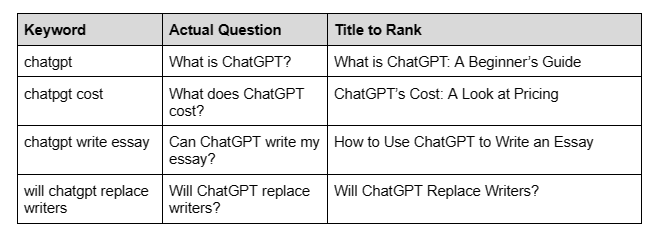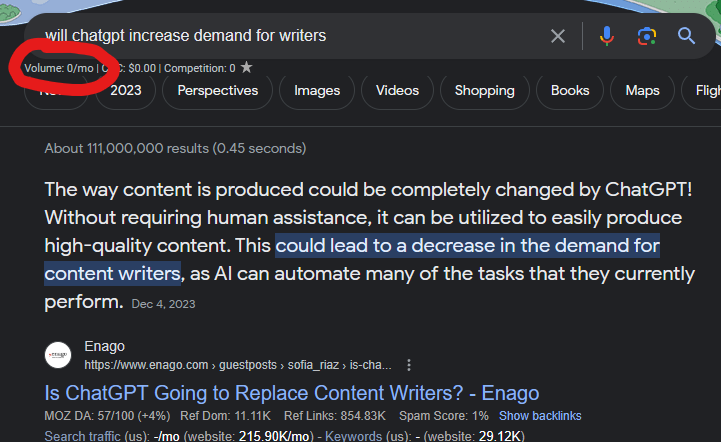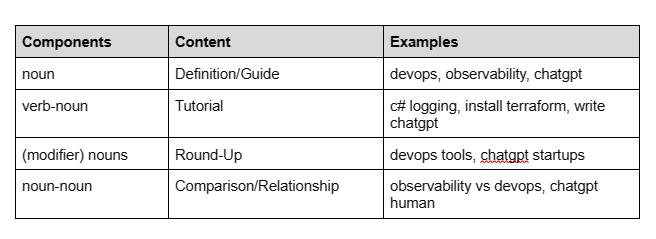The Challenge of Working Backward From a Post Title to a Keyword
Something we’re asked all the time is how to match a keyword to an interesting title for a blog post that someone has brainstormed. A client has an idea for an article title, such as “Why ChatGPT Will Actually Increase the Demand for Human Writers,” and then asks what keyword they should target, or, more generally, if ranking and traffic are possible. I’ll explain how to evaluate this.
But before going any further, let me say something, full stop. The answer is almost certainly “No, organic traffic isn’t possible for your title.”
I will, of course, get into why, but I want to set expectations right up front.

Courtesy of https://unsplash.com/@cdd20
Editorial Premises vs. Search Query Premises
As someone now in my second decade of posting discursive rants to anyone willing to listen (by which I mean blogging on DaedTech), I’m very used to coming up with novel or provocative titles. I like to think I’m decent at it, and it’s fun.
I work in literature or pop culture references, I riff on other famous titles, I offer novel premises, and I do it all in pursuit of editorially interesting titles and content. I’m guessing you do this too, and probably better than I do.
Editorial premises are how people and brands tell interesting stories. They tend to share a thematic undercurrent of “Here’s a novel idea you’ve probably never thought of before” and a title that teases the surprise, interest, and a-ha moment that the reader will experience. This is, after all, how newspaper columns work and how you can build interest—and thus readership and a following.
It is, however, categorically not how people use a search engine.
Content that addresses searchers’ intents (and thus ranks and drives traffic) has tactical, boring, straightforward premises and does well not to tease anything in the title.
Keyword Volume and Specificity
Let’s consider the hypothetical article above: “Why ChatGPT Will Actually Increase the Demand for Human Writers.” If I hadn’t just made that up on the fly, it would be a fascinating, unexpected premise, and you might click on it thinking, “Wow, really, I’ve got to see the argument for this. I’d never have thought of that.”
And therein lies the problem. You need to think of something in order to Google it.
Now consider the kinds of search queries that people would actually ask about ChatGPT.

The top three entries all have some search volume but are completely unrelated to our article’s premise. The fourth entry is getting warmer, but my post still wouldn’t rank for it, and the volume is getting low (320 searchers per month at the time of writing).
By the time we get to the original premise, we’re out of volume altogether:

This makes sense for two reasons:
- People view the search engine as an index of simple concepts, and they tend to hew away from philosophical or open-ended questions.
- I dreamed up the title premise because it seemed interesting, counterintuitive, and novel. People can’t search for things they’ve never thought of.
Giving It a Go: Working Backward
With caveats out of the way, what would it look like to try to work backward from a title to a keyword? Let’s take a look at the mechanics of that.
Consider three main parts of speech that interest us in keyword-land:
- Noun: the star of the show and the “shortest tail” keyword.
- Verb: what someone (usually the reader) wants to do to the noun.
- Modifier (adjective/adverb): language qualifying a noun or verb.
Here are some searcher patterns that tend to have high volume. (This is also far from exhaustive and doesn’t capture nuance like noun-verbs and subject/object, so please bear with the oversimplification.)

To go about reverse engineering a reasonable keyword from a title, we want to strip the title down for parts and look for things that are even remotely relevant. And it’s always going to center around a noun, which is the bedrock/short-tail of any keyword.
Stripping Our Title for Parts
“Why ChatGPT Will Actually Increase the Demand for Human Writers”
We have three nouns from which to choose, which are “ChatGPT,” Demand, and Writer(s). “Demand” is kind of a side dish, so we’re really looking at keywords about ChatGPT, writers, or both.
The most promising thing to try is then “ChatGPT writer” since our article is, at its core, about the relationship between ChatGPT and (human) writers. Here is what comes of this line of thinking:
- “ChatGPT writers” has 22,200 searches, but they turn out to be navigational, meaning that people are just looking for a plugin and site by that name.
- “ChatGPT human writers” has results examining whether or not the technology will replace human writers, but like the screenshot above, is showing no actual volume.
Novel premises are often ones that combine two or more nouns in unexpected ways, which means it’s probably time to give up at this point. But let’s soldier on just to be thorough.
Let’s not bother with “writers” or “human writers” as standalone search terms, since ChatGTP is really the central premise and star of the show. We’ll work outward from there, testing out concepts.
- “ChatGPT”? Nah, this isn’t a definition of what ChatGPT is.
- “ChatGPT increase demand”? Nah, that’s nonsense.
- “Why ChatGPT”? Nah, that would have to be an article about why someone built it.
We’re running out of words in the title to pair with ChatGPT. So now we need to start getting creative.
Hmm…this is about the future, so what about “ChatGPT future?” That seems winnable and has volume, but the results are generally about the future of ChatGPT itself and work in general. This means they’re not about writers, specifically. We’d need to bait and switch with our title and content to rank here, which is never a good idea.
Okay, so what about “ChatGPT writer future?” Bummer, no volume.
Defining an Algorithm
This is the line of thinking you need to pursue. Here’s a specific algorithm:
- Start by combining the nouns in your title.
- If that doesn’t work, leave out progressively less important nouns until you find some volume.
- Add your verb(s) and see if you still have any volume.
- Add your modifier(s) and see if you still have any volume.
- At each step, check the tenuousness of relationship between the keyword and premise.
How it Usually Plays Out
When you do this, here are the likely outcomes, in exponentially increasing order of likelihood:
- Your novel combination of nouns, verbs, and modifiers is winnable and has search volume.
- You keep ceding relevance until you target something with a trickle of search volume that might be winnable.
- There’s no way you’re getting search traffic to the post.
The way I’d suggest thinking of this is to imagine that you write a blog post that you think will interest your audience. Then imagine someone came to you and said, “Great, now go find the Quora question that your post is the number one answer for.”
How likely do you think you are to find that question? You’d need the question (keyword) first and the answer second, not the other way around.
This is the core truth of creating content to rank in search. It’s far more like participating in a Q&A site than writing an editorial column or telling stories.

 @Samric24
@Samric24 @neststayhome
@neststayhome